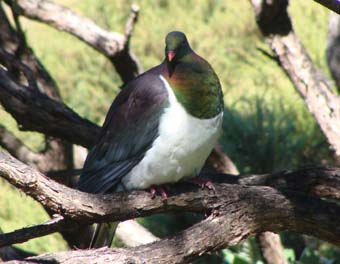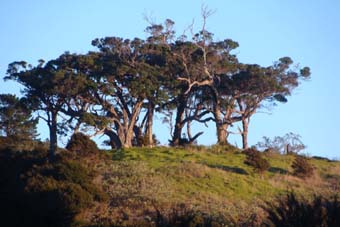Please show your support of Waihekepedia by adding a link to us from your web site. Waihekepedia T Shirts now available at the Ostend Market
Difference between revisions of "Onetangi Reserve"
Hackademic (talk | contribs) |
|||
| (3 intermediate revisions by 3 users not shown) | |||
| Line 1: | Line 1: | ||
| − | Onetangi Reserve is more than 50ha of bush valley at the rear of the Onetangi wetlands, owned by [[Forest and Bird]], protected under the Reserves Act and open to the public. Half a kilometre from [[Onetangi Beach]], and between Scotts Tce and Waiheke Rd, the reserve can also be accessed from Fisher Road and Trig Hill Road. Once known as Eddie Brown's Bush after a former owner, the reserve is considered the best examples of remnant forest left on Waiheke. These days it is popular with walkers. [http://www.forestandbird.org.nz/Enjoy_Nature/Reserves/onetangi/onetangimap.asp Tracks] go both around and across the reserve. Highlights include deep [[nikau palm]] groves and a stand of young, but nevertheless impressive, kauri. [[Kereru]], tui, piwakawaka and riroriro are among birds commonly seen in the reserve. | + | [[Image:Kereru1.jpg|100px|left|frame|Kereru in a kanuka in the Onetangi Reserve.]]Onetangi Reserve is more than 50ha of bush valley at the rear of the Onetangi wetlands, owned by [[Royal Forest & Bird Society|Forest and Bird]], protected under the Reserves Act and open to the public. Half a kilometre from [[Onetangi Beach]], and between Scotts Tce and Waiheke Rd, the reserve can also be accessed from Fisher Road and Trig Hill Road. Once known as Eddie Brown's Bush after a former owner, the reserve is considered the best examples of remnant forest left on Waiheke. These days it is popular with walkers. [http://www.forestandbird.org.nz/Enjoy_Nature/Reserves/onetangi/onetangimap.asp Tracks (link is broken as of 2008/12)] go both around and across the reserve. Highlights include deep [[nikau palm]] groves and a stand of young, but nevertheless impressive, kauri. [[Kereru]], tui, piwakawaka and riroriro are among birds commonly seen in the reserve. |
Description: Lots 41-42 DP 16850 and being part Allotment 38 C/T 1313/37; lots 346-354 DP 16850 and being part Allotment 38 C/T 2091/21; lots 20-21 DP 11657 and being part Allotments 38, 53 and 70 C/T 1589/31. | Description: Lots 41-42 DP 16850 and being part Allotment 38 C/T 1313/37; lots 346-354 DP 16850 and being part Allotment 38 C/T 2091/21; lots 20-21 DP 11657 and being part Allotments 38, 53 and 70 C/T 1589/31. | ||
| Line 10: | Line 10: | ||
In 1989 Waiheke members formed the Hauraki Gulf Islands branch of the society (fomerly the Hauraki Islands Section), which now manages the reserve and has a ranger appointed for it. | In 1989 Waiheke members formed the Hauraki Gulf Islands branch of the society (fomerly the Hauraki Islands Section), which now manages the reserve and has a ranger appointed for it. | ||
| − | [http://www.forestandbird.org.nz/Enjoy_Nature/Reserves/onetangi/onetangi.asp More history] can be read on the society's website. | + | [http://www.forestandbird.org.nz/Enjoy_Nature/Reserves/onetangi/onetangi.asp More history] can be read on the society's website. [[Image:pohutukawa_onetangi.jpg|100px|right|frame|Ancient pohutukawa survive on an open knoll at the top of the Onetangi Reserve.]] |
[[Category:Parks and Reserves]] | [[Category:Parks and Reserves]] | ||
[[Category: The environment]] | [[Category: The environment]] | ||
Latest revision as of 07:52, 31 August 2009
Onetangi Reserve is more than 50ha of bush valley at the rear of the Onetangi wetlands, owned by Forest and Bird, protected under the Reserves Act and open to the public. Half a kilometre from Onetangi Beach, and between Scotts Tce and Waiheke Rd, the reserve can also be accessed from Fisher Road and Trig Hill Road. Once known as Eddie Brown's Bush after a former owner, the reserve is considered the best examples of remnant forest left on Waiheke. These days it is popular with walkers. Tracks (link is broken as of 2008/12) go both around and across the reserve. Highlights include deep nikau palm groves and a stand of young, but nevertheless impressive, kauri. Kereru, tui, piwakawaka and riroriro are among birds commonly seen in the reserve.
Description: Lots 41-42 DP 16850 and being part Allotment 38 C/T 1313/37; lots 346-354 DP 16850 and being part Allotment 38 C/T 2091/21; lots 20-21 DP 11657 and being part Allotments 38, 53 and 70 C/T 1589/31.
History
The Royal Forest & Bird Society bought the reserve in 1962. In the 1960s and again in the 1980s locals put much effort into the clearing of gorse and other weeds.
In 1965 the society bought the cottage at 3 Scotts Tce, which it still lets out to members and non-members.
In 1989 Waiheke members formed the Hauraki Gulf Islands branch of the society (fomerly the Hauraki Islands Section), which now manages the reserve and has a ranger appointed for it.
More history can be read on the society's website.

